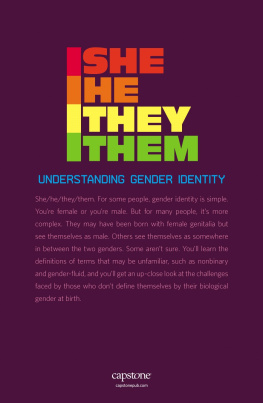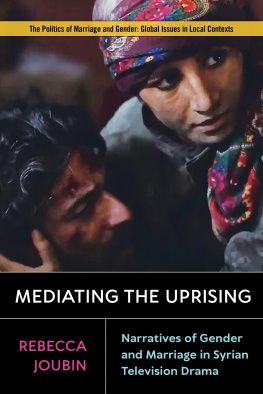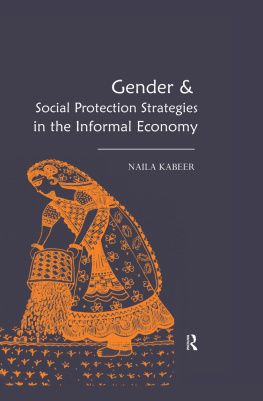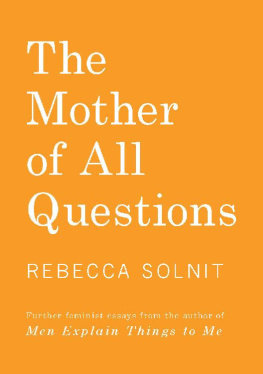
GENDER AND SOCIAL PROTECTION IN THE DEVELOPING WORLD
Gender and Social Protection in the Developing World highlights a key gap in the current design of social protection programs and policies. Taking into account the barriers that women face in accessing resources, mainstreaming gender equality in social protection interventions is critical. This publication contributes to a rethinking of current interventions on social protection.
Lilian Keene-Mugerwa, Chair, Africa Platform for Social Protection
A timely and critical addition to the literature on this subject - the authors guide the reader to an approach to social protection that leads towards real transformation. Comprehensive yet context specific, this book provides an excellent balance of theory with practical guidance.
Suzette Mitchell, UN Women (Vietnam)
Holmes and Jones convincingly demonstrate that only social protection policies developed with a gender lens can alter the causes of poverty and vulnerability. Their prescriptions for programme change have the potential to transform lives on the ground. This book should be required reading for academics and practitioners alike.
Liesl Haas, Department of Political Science, California State University
About the Authors
Rebecca Holmes is a Research Fellow in the Social Protection Programme at the Overseas Development Institute. Her research and policy work focuses on the linkages between social protection and social policy, and she has particular expertise in gender analysis. With a geographical focus on South and South-East Asia, her research includes studies on gender and social protection effectiveness, social protection and social inclusion, and social protection in fragile and post-conflict states. She has published widely for a range of governmental, non-governmental and donor audiences on social protection, and has spoken at a variety of public events and conferences on social protection.
Nicola Jones has a PhD in political science and is a Research Fellow in the Social Development Programme at the Overseas Development Institute (ODI). Her research, advice and public affairs work focuses on gender analysis, social protection and poverty reduction policies, child well-being, and the linkages between knowledge, policy and power. Since 2007 she has led a number of multi-country studies on the intersection between social justice and social protection in Africa, Asia, Latin America and the Middle East. She is currently a lead researcher in a cross-country study on citizen perceptions of cash transfers in sub-Saharan Africa and the Middle East, and is managing a regional review of gender-responsive social protection in Southeast Asia for UN Women.
Nicola has published widely for a range of academic, policy and practitioner audiences, including six co-authored books. The most recent are: Knowledge Policy and Power in International Development: A Practical Guide (2012) with Policy Press and Children in Crisis: Seeking Child-sensitive Policy Responses (2012) with Palgrave.
GENDER AND SOCIAL PROTECTION IN THE DEVELOPING WORLD
Beyond Mothers and Safety Nets
Rebecca Holmes and Nicola Jones
Zed Books
London & New York
Gender and Social Protection in the Developing World: Beyond Mothers and Safety Nets was first published in 2013 by Zed Books Ltd, 7 Cynthia Street, London N1 9JF, UK and Room 400, 175 Fifth Avenue, New York, NY 10010, USA
www.zedbooks.co.uk
Copyright Rebecca Holmes and Nicola Jones 2013
The rights of Rebecca Holmes and Nicola Jones to be identified as the authors of this work have been asserted by them in accordance with the Copyright, Designs and Patents Act, 1988
Typeset in Sabon by Swales & Willis Ltd, Exeter, Devon
Index:
Cover design by www.roguefour.co.uk
Cover photo Aubrey Wade/Panos
All rights reserved. No part of this publication may be reproduced, stored in a retrieval system or transmitted in any form or by any means, electronic, mechanical, photocopying or otherwise, without the prior permission of Zed Books Ltd.
A catalogue record for this book is available from the British Library
Library of Congress Cataloging in Publication Data available
ISBN 978 1 78032 044 1
Contents
Illustrations
Tables
Figures
Foreword
Social protection is arguably the great success story of development policy in the new millennium. Millions of poor people across Africa, Asia and Latin America are demonstrably better off because they have received cash or asset transfers, temporary employment during the annual hungry season, subsidised access to services, or other forms of social assistance and social insurance.
Yet social protection is often accused of being insufficiently gender-sensitive, or of dealing with gender only superficially. Female-headed households are routinely classified as a vulnerable group in need of safety nets, perpetuating the treatment of women as dependents, alongside orphans and older people. In public works programmes, women are often under-represented because men take most of the work places but if gender quotas are introduced insensitively, women can become over-burdened because they carry a disproportionate share of social reproduction responsibilities at home.
In this important book, Rebecca Holmes and Nicola Jones challenge the inadequate treatment of gender in social protection programming, highlighting the costs of this oversight and making a powerful case for moving beyond mothers and safety nets towards a transformative approach that will empower women and ensure more gender-equitable outcomes. Instead of just alleviating the consequences of poverty and vulnerability with social transfers for targeted vulnerable groups, social protection should recognise and address the underlying causes of poverty and vulnerability, many of which are driven by gendered inequities at the societal level.
The cross-country research on which this book is based reveals that there are instrumental as well as ethical justifications for applying a gender lens to social protection. Instrumentally, policies and programmes that are sensitive to gender are likely to achieve better outcomes in terms of their own objectives. The economic costs of gender gaps in education, health and employment can be quantified, so interventions that recognise and address these gaps are good not only for girls and women, but also for poverty reduction and economic growth. Ethically, I agree with the authors that equality between women and men equal rights, opportunities and responsibilities is a human right and a matter of social justice. It follows that social protection that reduces inequalities between women and men, or between girls and boys, is also good for social justice.
One reason why social protection might have failed to develop a gender lens is that it has been appropriated by governments and some international agencies as a set of instruments for poverty reduction, and poverty is measured by economists at the household level. However, social protection addresses vulnerability as well as poverty in fact I would argue that vulnerability management should be its primary focus, with poverty reduction a secondary objective and vulnerability is experienced by individuals, not households. Differentiated vulnerabilities require differentiated interventions, so gender-specific and gender-intensified vulnerabilities and inequalities require gender-sensitive social protection.












